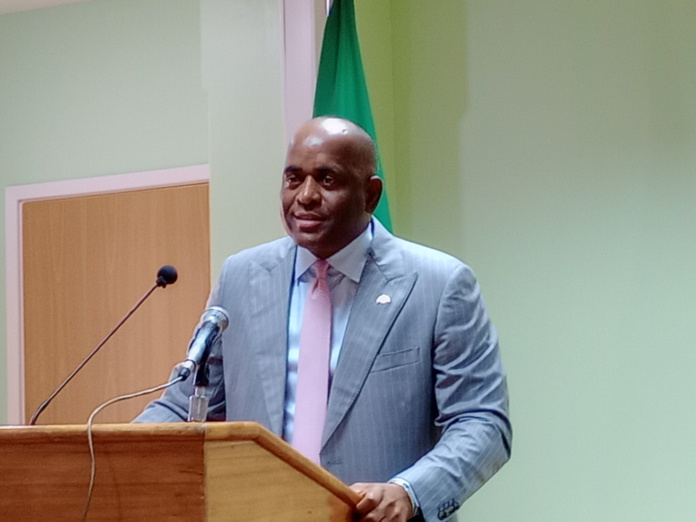
by STAFF WRITER
ROSEAU, Dominica, Apr 5, CMC – Dominica’s Prime Minister Roosevelt Skerrit has identified contingent rights as the main issue that is preventing Caribbean Community (CARICOM) countries from facilitating the free and full movement of CARICOM nationals as had been hoped by the end of last month.
“At the last virtual heads meeting it was decided that a series of meetings will take place leading up to the next meeting in Grenada to complete outstanding amendments to the treaty,” informed sources told the Caribbean Media Corporation (CMC) earlier this week.
But Skerrit, speaking at a news conference here, said “Obviously, the sticking point for some countries is in respect to the contingent rights.
“For people to move, what are the benefits should they be entitled to when they move to the respective countries within the Caribbean Community? So that has been some sticking point.
“As I have indicated to the CARICOM heads this is not a legal question, because some…were asking for it to be sent back to the Legal Affairs Committee. The Legal Affairs Committee is made up of attorneys general,” Skerrit told reporters.
At the end of their summit in Guyana in February, Barbados Prime Minister Mia Mottley, who has lead responsibility for the CARICOM Single Market and Economy (CSME) told reporters “We are on target” as it pertained to the free movement of CARICOM nationals.
The regional leaders were due to meet in mid-March for the anticipated sign-off on the arrangements to facilitate CARICOM nationals’ free and full movement by the end of that month.
The CSME allows for the free movement of goods, skills, labour, and services across the region.
Under the existing free movement of skills regime, persons seeking to work in member countries are required to obtain a CARICOM Skills Certificate. But apart from university graduates, artists, musicians, sportspeople, media workers, nurses, teachers Associate degree graduates, domestic and artisans, all other categories of workers would need to work permit for the country which they are entering.
Skerrit told the news conference that the issue is a “political question and I think it is in the lap of the heads of governments to deal with in their respective cabinets in their respective countries.
“That’s the issue there. I have been backing this for the past 20 years within CARICOM almost to the point of exasperation. But when you seeking to give someone some benefits you should never allow your exasperation to cause you to give up.
“I am not giving up at all,” Skerrit said, adding “We continue that fight of getting countries to agree to these rights”
He told the news conference that in Dominica’s case, the issue of contingent rights is not an issue for us at all because even without the complete free movement any CARICOM national coming to Dominica gets the same benefits as Dominican citizens.
“Their children go to school for free, their children can get scholarships as well, they go to the hospitals, we will not deny them medical care, etc etc. So those things are there.”
Skerrit said that while he respects the position of the countries “I think on this point we have to look at the greater good and there can’t be any single market and there can’t be any efforts towards a single economy, if it is not free…
“It is happening in Europe. I mean, we little islands here, we were all colonies of Great Britain and so on …people used to move freely back in the 30s and the 40s and we are supposed to be more enlightened and more progressive now, than then and we have more forms of moving around, now than then and we have all sorts of issues that we want to bring to the table.
“I mean the reality is since we introduced the category of free movement of persons we have not seen any dramatic movement of one country to the other,” SSkerrit told reporters,” adding“In Dominica’s case we will move ahead and we will not do it on any reciprocal basis. “We will do it carte blanche,” Skerrit said.
The regional leaders have been saying that the Community is on track to fulfill the
mandate regional leaders gave at their historic 50th-anniversary summit in Trinidad and Tobago in July last year for free and full movement of CARICOM nationals from 31 March 2024.
But in the ongoing negotiation process, Antigua and Barbuda has already signaled that it wishes to maintain its use of the current skills regime, which allows it to focus on addressing labour force demand in the local market.
“The policy is pragmatic and realistic to avoid dislocation of the indigenous population, protecting jobs, and avoiding exacerbation of our economic/fiscal challenge,” said Antigua and Barbuda’s Ambassador to CARICOM, Dr. Clarence Henry.
The Bahamas and Bermuda have also indicated that they would not be part of the free movement of people across the region.
CMC/pr/ir/2024–

